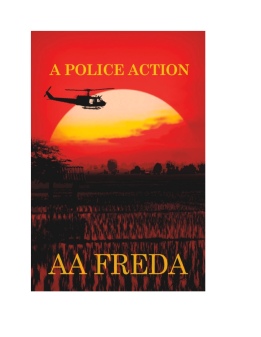 Title: A Police Action
Title: A Police Action
Genre: Coming of Age Novel
Author: A.A. Freda
Website: www.aafreda.com
Publisher: Dorrance Publishing
Find out more on Amazon
Award-winning novelist A.A. Freda received high acclaim for his debut novel, Goodbye Rudy Kazoody. In his second novel, A Police Action, Freda delivers a gripping Vietnam era novel about two lost, confused young adults, Samantha Powers and James Coppi. A Police Action has garnered high early praise:
“Well written and historically accurate, A Police Action is a reminder of what the 1960’s were really like, for better or worse.”
—Foreword Clarion
“Fluid, beautifully crafted, and emotionally rich. A brilliant intersection of coming-of-age and romance.”
—Manhattan Book Review
“An engrossing tale that moves deftly from the battlefield to the heart.”
—Midwest Book Review
“A spellbinding story with a powerful setting”
—Readers’ Favorite
About A Police Action: It is love at first sight when nineteen-year old Samantha Powers meets James Coppi at the Country Honky Tonk in Colorado Springs. There are just two problems standing in the way of a storybook ending for Samantha’s passion: she is pregnant with someone else’s child—and James, a young soldier, is heading for a war in Vietnam. But is there something more to this instant attraction? And what will happen after James is deployed? Will he return home safely, and, if so, will it be for Samantha? For James and Samantha, it seems uncertainty is the only certainty. A moving story that unfolds as James and Sam mature through individual and shared hardships, A Police Action is unforgettable.
A solid and thought-provoking novel, A Police Action is a richly textured tale resplendent with vivid historical detail. In this unique story that blends elements of coming-of-age, romance, and historical fiction, novelist A. A. Freda captures the atmospheric, turbulent late 60s, the heady rush of young love, and the unmistakable restless uncertainty of youth. A powerfully realistic story informed by Freda’s own experience in Vietnam, A Police Action brings to life the spirit and the struggles of the 60s. With its engaging premise, multi-dimensional characters and gripping storyline, A Police Action is an extraordinary tale extraordinarily well told.
Chapter 1
The Launching Point
The Launching Point
Coppi’s definition of a lifer is any man who enlisted to join the service, any soldier that has the initials RA on his dog tags, RA standing for Regular Army. Draftees, like Coppi, are not lifers. Their dog tags begin with the letters US, which stands for United States. The army probably doesn’t even consider them regular soldiers.
To Coppi, there is also a difference between a lifer and a true lifer. A lifer is a mixed-up jerk who joined the army for some stupid reason, probably to get away from something in his pathetic life on the outside. Once in the army, the poor slob realizes his mistake and wants to go home just as much as a draftee does. Unfortunately for him, his mistake will cost him an extra year of active duty.
A true lifer is a loser who has made the military a career.
• • • • •
Specialist Fourth Class James Coppi comes out of the company headquarters where he’s just reported for duty, early one mid-April evening, picks up his duffel bag, and heads to the barracks. A drab gray building of horizontal planks, it looks the same as all the other barracks he’s seen since being drafted. It makes him long for home for a minute—but just a minute—and then the beautiful Colorado evening with its night sky already full of stars reminds him that the Bronx was no Garden of Eden, either.
Coppi hasn’t seen so many stars in the sky since he was a young boy in his native Italy. The air is already beginning to freshen, a cool breeze moving across his face and carrying with it the aroma of those fields of bright-blue flowers he saw out the window of his plane as it landed earlier. What were they called … Texas bluebells? Yes, that’s the name. The sight of acres of deep sky blue blooms had stayed with him. There is something else in the air, too—a chill following not far behind the fading sun and the fragrance of the flowers; he wouldn’t be surprised if during the night there’s a late-spring freeze. He’s read that the night temperature in the Rockies can easily drop fifty degrees.
He still can’t believe he’s headed for Vietnam. Only ten months left on his tour—he’d thought he was in the clear. What draftee goes to Nam in his last ten months? He will have only six months remaining on his service when this unit heads out, sometime in July. The army must be really hard up for men. The news coming from the conflict is bad. The Tet Offensive, mounted by the North Vietnamese Army, has shown the general public that victory for the Americans, as assured them by the politicians, is not imminent. The news is so bad that Lyndon Johnson has dropped out of his reelection bid. The stubborn fool still won’t accept reality and defeat. So, what’s his plan…to increase the forces fighting in Southeast Asia to more than five hundred thousand? To what end?


